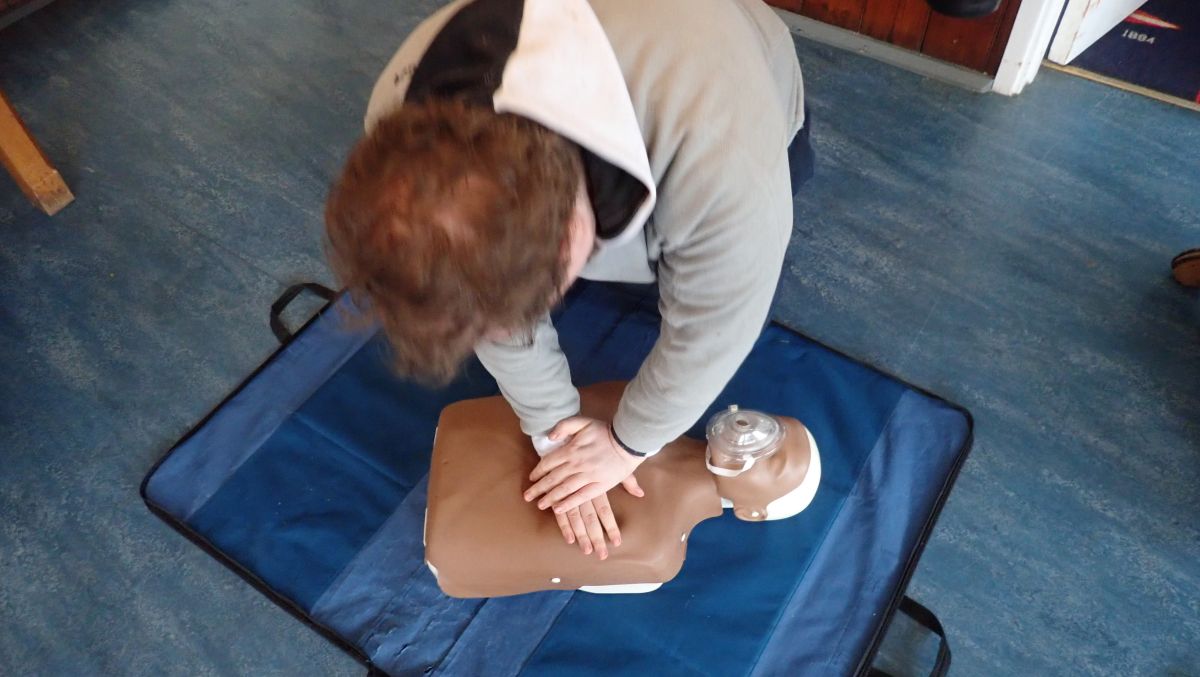admin Date , January 4, 2025 Sailing Previous Blog New Year 2025 Cancelled Comments (0)
A Saturday Course run by an outside company with a Healthcare professional running the course. We went through all of the RYA syllabus on first Aid and all the things we needed to know, from CPR and AED machines to bandaging and how to summon help. First aid is an essential skill that can make a critical difference in emergencies. Whether on land or water, knowing how to respond promptly and correctly to injuries or medical issues can save lives. The Royal Yachting Association (RYA) offers a Basic First Aid Course, specifically tailored for those spending time on or near the water.
Accidents and medical emergencies can happen anywhere, and often, professional medical help isn’t immediately available. For sailors, boaters, and water sports enthusiasts, this reality is even more pronounced. A Basic First Aid Course equips you with the knowledge to:
Respond effectively in emergencies.
Stabilise injured individuals until professional help arrives.
Understand common injuries and illnesses encountered in water-based environments.
Having these skills not only improves safety but also boosts confidence when venturing out on the water. First Aid is learning about helping others is also about you keeping yourself safe and summoning help BEFORE helping the patient. If no help is coming a First Aider can't achieve anything. Getting help now is so much easier than before mobiles and in a life or death situation having someone at the other end of a mobile on speaker phone can make all the difference.
The course is interactive and designed to simulate real-life scenarios. The Participants work with mannequins, practice bandaging, and engage in role-playing exercises to build confidence in applying their skills. By the end of the session, attendees have a practical understanding of how to act effectively in emergencies.
A Basic First Aid Course, such as the one run by the RYA, typically spans a single day and is designed to be hands-on, practical, and engaging. Key topics include:
1. CPR and Defibrillator Use
Participants learn how to perform Cardiopulmonary Resuscitation (CPR), a critical skill for restarting a stopped heart. Training often includes the use of an Automated External Defibrillator (AED), a device that delivers an electric shock to restore a normal heartbeat.
2. Dealing with Unconscious Casualties
Learn how to assess an unconscious person, place them in the recovery position, and ensure their airway remains open while waiting for professional help.
3. Bleeding and Wound Management
From minor cuts to severe bleeding, this section teaches how to control blood loss, dress wounds, and prevent infection. This is particularly useful for injuries involving sharp objects commonly found on boats.
4. Shock Recognition and Treatment
Shock can occur due to blood loss, allergic reactions, or trauma. The course covers how to recognise the signs of shock and provide the necessary care to stabilise the patient.
5. Hypothermia and Cold-Water Shock
Given the aquatic environment, understanding hypothermia and cold-water shock is crucial. Learn how to warm someone safely, manage symptoms, and prevent further cooling.
6. Burns and Scalds
Accidents involving hot liquids or equipment can lead to burns. The course covers initial treatment, such as cooling the burn, and when to seek further medical attention.
7. Choking and Airway Blockages
Participants practice techniques to help someone choking, including back blows and abdominal thrusts.We practiced several different types of bandage for several different types of wound and found the best uses for a triangular bandage.
All the information we need to know is in a well laid out book and everything we needed to use should be in the First Aid Kit. The skills learned in a Basic First Aid Course are not limited to boating. They’re equally useful in day-to-day life, whether dealing with minor injuries at home, helping someone at work, or responding to a medical emergency in public.
For instance, knowing how to perform CPR can be lifesaving during a cardiac arrest, and understanding how to treat burns or stop bleeding can prevent a minor incident from escalating.
This course is held annually in the New Year at the Upper Thames Sailing Club to ensure that members requiring training can be recertified every three years, staying up to date with the latest First Aid best practices. As an RYA-certified course, it is also open to RYA members who are not part of the club.
A Basic First Aid Course is an investment in safety and preparedness. Whether you’re a seasoned sailor or a complete beginner, these skills can make all the difference in an emergency. Courses like the RYA’s provide tailored, practical training that ensures you’re ready to act when it matters most.
The RYA’s Basic First Aid Course is specifically tailored for maritime environments, focusing on challenges unique to water-based activities. For example, it addresses:
The effects of prolonged exposure to cold water.
Moving casualties in confined spaces on boats.
Using marine communication tools to contact emergency services.
Additionally, RYA certification is widely recognised, making it a valuable qualification for anyone involved in boating or sailing.
So, why not make it a New Year’s resolution to attend a first aid course? You’ll walk away with more than just a certificate—you’ll have the confidence and ability to help others when they need it most.
